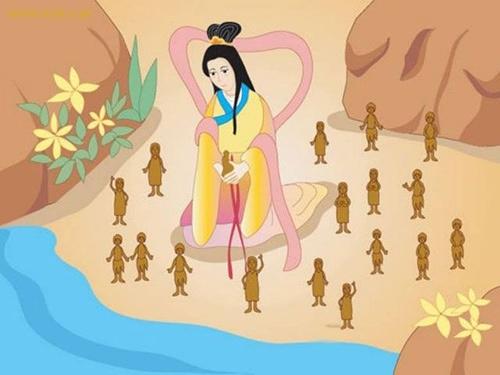The Chinese character “Fu” (blessing) symbolizes a positive, joyful atmosphere. As the Chinese New Year approaches, Chinese families traditionally hang up this character hoping for a wonderful new year.
Origin and Meaning
Ever since China established its own writing system thousands of years ago, the character “Fu” has existed.
In the ancient oracle-bone inscription, “Fu” meant “Offering food and wine to the gods with both hands.” The ancients carried out this ritual by praying to heaven and worshipping the gods, seeking peace and joy.
Thus, “Fu” has come to be defined as blessing.
The meaning of the character “Shi, 示,” the left radical of “Fu, 福,” means altar, which is associated with ritual, gods, praying, and anticipation. In ancient times, people went to the altar to receive guidance and divine revelation from gods.
The “一口田” of the right part of “Fu, 福” can be interpreted as, “A land given by gods.” Everyone has a land or a land of conscience, bestowed by the heavens.
If one can retrieve that land of purity in his heart, blessings will befall immediately. This implies that if one believes in the gods, they will bestow blessings upon you.
Heaven and ‘Fu’
Everyone wants good luck and blessings rather than misfortune. So, how can people get them?
Two old sayings explain how “good luck” comes about. “Heaven has no favorites, but often accompanies those who are kindhearted” and “Heaven has no favorites, but helps those with virtue” mean that heaven does not look to an individuals’ status or birth. It treats all people who conform to the ways of heaven equally. Thus, Heaven’s ways always stay with kindhearted people and help them do things very efficiently and miraculously.
Blessings and virtue are closely related. The relationship between virtue and blessings in traditional Chinese culture can be understood two ways:
First, whether one has blessings or not is decided by heaven. Second, everyone can change his fate through cultivating virtue.
Virtuous deeds retain heaven’s blessings, while bad deeds cause misfortune and suffering.
Two old Chinese sayings express the thought that the good and bad fortune people encounter are not accidental: “Fortune and misfortune come from nowhere, but are only summoned by people themselves” and “Calamities originate from evil doings, while blessings come from virtue.”
Sun Simiao, a famous medical doctor in the Tang Dynasty, in his “Comments on Blessings and Longevity” said, “Fortune is the product of accumulated good; misfortune is the result of accumulated evil.”
Sun also wrote, “Blessings can be well utilized.” Sun taught, and the ancient Chinese believed, the fortune derived from good deeds and helping others not only can increase an individual’s own blessings, but also can benefit future generations.
Correspondingly, if an indecent person has no virtue, commits all kinds of evil, and is full of evil desires, “misfortune” will come upon him right away.
Do Kindhearted People Live Longer?
A research study conducted at the University of Michigan shows that on average people who often do volunteer work live longer. Also, elderly people who spend 100 hours a year helping others live longer than their nonactive counterparts.
Sonja Lyubomirsky, a psychology professor at the University of California, found that doing five good deeds a day for six consecutive weeks could significantly improve a person’s physical and mental state, putting one in a virtuous circle. The more effort put in, the better the results; it’s like taking supplements.
Other studies have shown that when people are doing kind deeds, brain neurotransmitters help make them have a pleasant feeling.
By being kindhearted, people can reduce physical and mental pressure, which has a positive impact on their health. So, living longer is not only related to good genes and health, but also depends on your mindset.
Although the character “Fu” is synonymous with sincerity and kindness, it is not just a feeling, but also a kind of cultivation.
Read the original article in Chinese:



